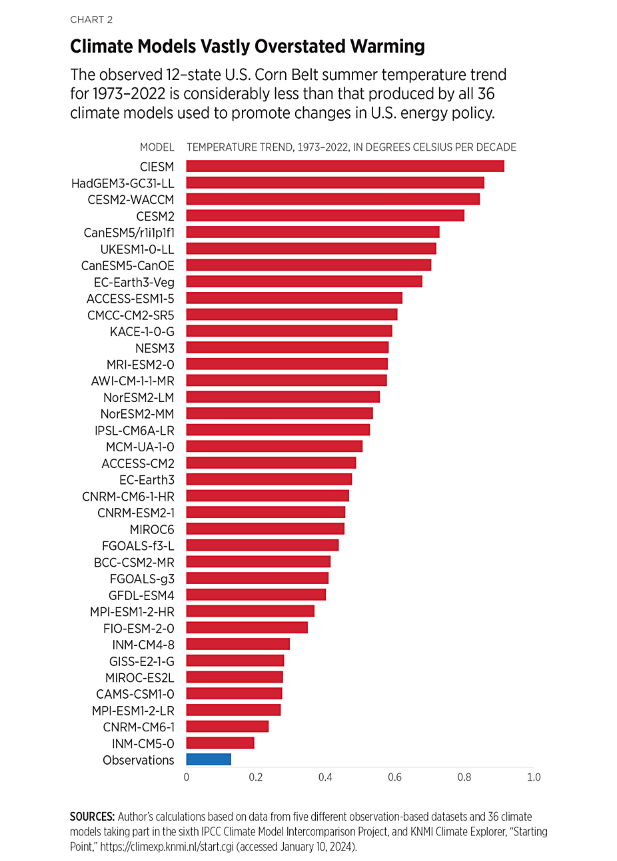The Finance Committee of the Appleton City Council will meet at 5:30 p.m. on Monday, April 21. Among the items on its agenda is a proposal to pay $100,000 to a consultant to develop a “climate action plan.”
Alderman Sheri Hartzheim calls the proposal “ridiculous.” I wholeheartedly agree, for the reasons outlined here.
Background
Proposals to address “climate change” are not new to Appleton.
In October 2019, the City Council adopted Resolution #13-R-19 Climate Change. The resolution established the Appleton Taskforce on Resiliency, Climate Mitigation, and Adaptation.
In January 2022, the Taskforce issued a 68-page Climate Action Plan. Among other things, the Taskforce recommended a “climate resiliency specialist” be hired by the city. It is my understanding this position continues to exist in the budget.
The 68-page Climate Action Plan contained nearly 50 recommendations. The plan is no longer available online; in the interests of transparency, the plan should be available for review by the public.
In March 2025, the City Council adopted, by a vote of 11–3, a goal of cutting the city’s greenhouse gas emissions in half — from 27,198 metric tons of CO2 equivalent to 13,599 metric tons. The city’s previous goal, adopted in 2019, was to achieve “net-zero emissions” by 2050 or earlier (that goal apparently remains as “an aspirational stretch goal.”) Council members Sheri Hartzheim, Brad Firkus, and Chris Croatt voted against the resolution. Duke Behnke of the Appleton Post-Crescent reported Firkus said a goal without a plan is just a wish.
The City’s “Sustainable City Master Plan” includes a brief section on Climate Protection. As “background,” it reports (emphasis is mine):
Human activities may be altering Earth’s climate by emitting greenhouse gases such as carbon dioxide into the earth’s atmosphere. Some believe that over the next century the earth’s average temperature will increase between 2º F and 10º F.
Must We Fear Climate Change?
The ridiculously wide forecast for an increase in the Earth’s “average temperature” — whatever that is — suggests how inaccurate the forecast is likely to be. The forecasts come from computer models that clearly don’t agree with each other. Nor do they agree with reality.
Dr. Roy Spencer wrote in January 2024:
Warming of the global climate system over the past half-century has averaged 43 percent less than that produced by computerized climate models used to promote changes in energy policy. In the United States during summer, the observed warming is much weaker than that produced by all 36 climate models surveyed here.
The chart reproduced here is from Spencer’s January 2024 paper.

Spencer is the country’s leading expert on climate change models and their accuracy vis-à-vis temperature reality. He received his Ph.D. in meteorology at the University of Wisconsin-Madison in 1981. He was a Senior Scientist for Climate Studies at NASA and received (with Dr. John Christy) NASA’s Exceptional Scientific Achievement Medal for their global temperature monitoring work with satellites. Spencer became a Principal Research Scientist at the University of Alabama in Huntsville in 2001.
In 2013, the authors of the 1,000-page research volume Climate Change Reconsidered: Physical Science wrote:
We conclude the current generation of GCMs [global climate models] are unable to make accurate projections of climate even 20 years ahead, let alone the 100-year period that has been adopted by policy planners. The output of such models should therefore not be used to guide public policy formulation until they have been validated and shown to have predictive value.
Questions
How much did the 2019–2022 Taskforce on Resiliency, Climate Mitigation, and Adaptation spend? Were consultants paid by the Taskforce, and if so, how much?
Does the city still employ a “climate resiliency specialist”? In which department does he/she reside? How much is he/she paid? What is his/her job description?
How many of the Taskforce’s Climate Action Plan recommendations have been implemented? Will that plan be made available to the public?
If the current Climate Action Plan is no longer available for the public to review, how can we know if the $100,000 consultant makes any recommendations other than those already in place? If none (or very few) of those initial recommendations have been implemented, why would we expect the recommendations of a new consultant to be implemented?
Conclusion
The proposal to spend $100,000 on a climate consultant is a duplicative waste of tax dollars. Appleton already employs a climate resiliency specialist. The City also has a Climate Action Plan that is little more than three years old, the result of two years of work by the Appleton Taskforce on Resiliency, Climate Mitigation, and Adaptation. Why do we need a new plan? Will taxpayers be permitted to know how much the climate resiliency specialist is currently being paid? Will they be permitted to see the 2022 Climate Action Plan?
The proposal is nothing more than virtue-signaling. Climate change is normal; there is no man-made “climate crisis” for Appleton to deal with. The black-box computer models used to forecast climate change are so inaccurate vis-à-vis observed temperatures as to be useless for policy planning.
The proposal creates perverse incentives for the budgeting process. If the Finance Committee is allowed to move money around without going through the proper budget process,
- a department may be incentivized to over-estimate how much it needs for a specific project: If the project comes in under budget, now there’s a “slush fund” they can use for other projects that might not have made it through proper budget channels. Alternatively,
- a department might be discouraged from looking for the lowest responsive bid if any savings it achieves are taken from it and used by another department.
Because this $100,000 is from borrowed funds, it should be used to pay down the borrowing — not spent on a new, unbudgeted, and wholly unnecessary consultant.



UPDATE: Happy to report the City Council rejected the consulting contract! Minutes are here: https://cityofappleton.legistar.com/View.ashx?M=M&ID=1283589&GUID=A9618171-A757-4284-835B-B7C99C938E10.
I won’t get too excited, though: As Alderman Sheri Hartzheim has reported (https://appletonwi.org/appleton-city-council-update-april-20-2025-climate/) this proposal has been before the committee in the past, and rejected then. Like a bad penny …